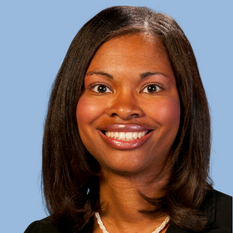 Tenille Kaus is only four months into her new role at The Legal Aid Society of Cleveland, where she leads diversity, equity, inclusion (DEI), and advancement for the nonprofit, but already she has a full plate. Charged with implementing legal aid’s DEI plan and designing strategies to ensure that the nonprofit considers DEI principles across all operations, Kaus has a big job promoting DEI at the organization, which serves five counties in Northeast Ohio.
Tenille Kaus is only four months into her new role at The Legal Aid Society of Cleveland, where she leads diversity, equity, inclusion (DEI), and advancement for the nonprofit, but already she has a full plate. Charged with implementing legal aid’s DEI plan and designing strategies to ensure that the nonprofit considers DEI principles across all operations, Kaus has a big job promoting DEI at the organization, which serves five counties in Northeast Ohio.
“DEI isn’t just an HR function,” Kaus said. “It affects our interaction with our clients, our employees, and the financial side of the house as well.”
Kaus’s role is a newly created position, and where it sits within the organization – on the leadership team and reporting to the executive director – signified its importance and attracted Kaus to the opportunity. What also appealed was legal aid’s direct assertion that it is committed to being an antiracist organization, a bold statement that jumped out to her.
“Legal aid has held themselves to a higher bar than most organizations by saying they want to become an antiracist organization,” she said. “What spoke to me about that statement is that they’re willing to do the hard work.”
An attorney by trade, Kaus’s background includes diversity leadership at various nonprofits, as well as experience in human resources and employment law, skills that are well-suited to the second component of Kaus’s job: implementing a system of advancement for all staff. To achieve this goal, Kaus is piloting a new peer mentoring program, launching employee resource groups, and taking a fresh look at the organization’s recruitment and retention strategies.
“If your culture is such that people of diverse backgrounds don’t feel included, don’t feel like they belong, and don’t feel like they can bring their whole selves to work, then you can recruit as much as you want, but retention will be an issue,” she said. “So, we’re going to look at our culture and focus on retention this year and in coming years.”
Legal aid’s leadership team, managing attorneys, and executive team also recently went through a training led by a consultant to examine all of legal aid’s policies through an antiracist framework. With a framework in place, leadership has the tools to evaluate if a policy is serving its goals.
“In being an antiracist organization, sometimes it’s the big flashy things, like the big brief filed with the Ohio Supreme Court or in federal court, and sometimes it’s working on what we do internally,” she said. “I think you’ll see both sides as we move forward at legal aid in Northeast Ohio.”
The Ohio Access to Justice Foundation is the largest funder of civil legal services in Ohio. A gift to the Foundation supports legal aid’s work.
